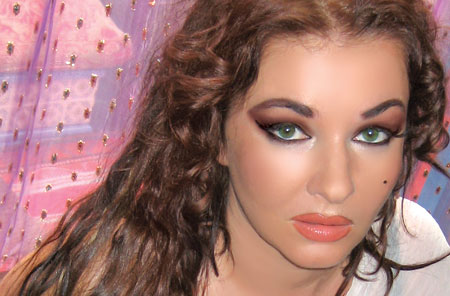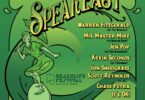Natacha Atlas is proof that it’s a small world after all. Born in Brussels, raised in England, performing mostly in Arabic, and famous the world over, this multilingual singer and dancer has worked with artists nearly as diverse as her own background. In fact, it might be impossible to decide the most impressive aspect of Natacha’s career in music: the sheer number of artists she’s collaborated with, the vast range of styles and genres she’s tackled in her career, or the number of awards and accolades she’s accumulated over the years. This one-woman musical United Nations extends her reputation with Mish Maoul, a tribute to the Moroccan music that ignited her imagination as a youth, but with Natacha’s distinctive touch, most notably the international influences that have continued to inspire her through the years.
As early as her teens, Natacha was being singled out for her singing talents, and she spent time in Arabic and Turkish clubs, as well as with a salsa band in Belgium. But in the early 1990s, a bigger audience caught on to her vocal gifts. She became a favorite among England’s alternative rock bands, especially Jah Wobble, the former bass player for Public Image Limited, the band formed by Johnny Rotten after the breakup of the Sex Pistols. On his own, Wobble investigated music from the Middle East, North Africa, and Eastern Europe, then brought these sounds together in the band Invaders of the Heart. Natacha Atlas was the perfect partner for these musical aspirations, and on their first album together, Rising Above Bedlam, she co-wrote five songs. In fact, she credits Jah Wobble for the continued presence of strong bass lines in her music.
Natacha’s work with Jah Wobble led to an invitation to join Transglobal Underground, a legendary group in the dance community. As their name suggests, Transglobal Underground made it their mission to bring together as many kinds of world music as possible, and Natacha’s voice and hips (that is, her singing and dancing) became two of the collective’s calling cards. As the lead singer and belly dancer, Natacha hooked many listeners and fans with her exotic, enticing voice, as well as her expert moves.
Her bonds with Transglobal Underground would outlast the group itself, as members of the collective all pitched in with their contributions to Natacha’s solo debut, Diaspora in 1995 and more of her works through the years, including Mish Maoul. Diaspora also established a new chapter in Natacha’s career; having expanded the boundaries of popular Western music with her voice and sensibilities, she further capitalized on this influence by bringing in notable names from world music, such as Tunisian singer/songwriter Walid Rouissi and Egyptian composer/oud player Essam Rashad. In the years to follow, her list of collaborators and admirers would swell to number Peter Gabriel, Tony Levin, the Indigo Girls, Belinda Carlisle, Daniel Ash, Syrian qanun virtuoso Abdullah Chhadeh, Jean-Michael Jarre, and David Arnold, among others.
With Natacha, inspiration is a two-way street. She has reinterpreted classic songs such as "I Put a Spell on You" by Screamin’ Jay Hawkins, "This Is a Man’s World" by James Brown, and "Mon Amie la Rose" by Francoise Hardy, putting her unique spin on these familiar tunes. At the same time, other artists have looked to Natacha’s tunes as an outlet for their creativity. Talvin Singh, Youth, Banco de Gaia, and DJ Spooky are just a few musicians who’ve reimagined and remixed Natacha’s compositions to turn world music on its head.
For her efforts in pushing the envelope, Natacha has been awarded in more ways than one. Of course, there’s her devoted worldwide following, with fans constructing websites and a MySpace page documenting the developments in her career, as well as uploading YouTube clips of her personal appearances and music videos. These labors of love have not been lost on Natacha, who appreciates the dedication of her fans and recognizes how these creations have helped her reach a wider audience. She says, "I think, Wow! They think enough of me to spend time and effort on getting me out there to the world…it’s very touching."
The Internet is not the only way to draw fans, and Natacha has gained her following the old-fashioned way: through extensive touring. Over the years, she has crisscrossed North America, Europe, and Africa, but new frontiers remain, even this veteran of the music scene. Last year, Natacha and her band toured the Ukraine for the first time.
Colleagues and fans aren’t the only ones who’ve fallen under Natacha’s spell. Critics have been just as supportive and bewitched, and she has the awards and nominations to show for it, beginning from her earliest forays into the international scene. Her list of honors started with a Mercury Prize nomination in 1992 for Rising Above Bedlam with Jah Wobble and also includes a Victoire de la Musique award (the French equivalent of the Grammys) for Best Female Singer in 2000. Natacha also received an EMMA (Ethnic Multicultural Media Award) as the Best World Music Act in 2004.
Natacha has been recognized outside of the music world, as well. In 2001, the United Nations appointed her a Goodwill Ambassador for the World Conference Against Racism. In selecting Natacha for the position, U.N. High Commissioner for Human Rights (and former president of Ireland) Mary Robinson noted, "Natacha’s music is an exciting mix of influences from East and West. She embodies the message that there is strength in diversity, that our differences — be they ethnic, racial, or religious — are a source of riches to be embraced rather than feared."
This commitment to considering philosophies and backgrounds other than her own is reflected in Natacha’s outlook on religion. She says, "I think there are many roads to spiritual aspects, and it’s important to be tolerant. I also feel it’s time we evolved further than killing people over land or belief systems."
This perpetually pioneering performer has no plans to rest on her laurels. Though Natacha has no predictions on how her future releases will sound, a couple of projects remain on her plate. Under consideration is an album of lullabies with Jocelyn Pook, well known for composing the score for Stanley Kubrick’s film, Eyes Wide Shut, among other achievements. So far, Natacha has turned down offers to write an autobiography, but it’s an idea that’s presented to her often.
Music is a global phenomenon, and nearly every society has its own take on what qualifies as pleasing, artful sounds. However, it’s rare to find an artist who truly bridges cultures, breaks boundaries between genres, and defies stereotypes all at the same time. Natacha Atlas may be one of the only artists in the world who can claim such an honor. Don’t call it dub or dance; don’t limit her to singing or dancing; and don’t pen her in as an Arabic or European artist. She’s all of the above and more.
LA’s the Place: Your album Mish Maoul has been seen by many as your best work to date, how do you see it in relation to your previous albums?
Natacha Atlas: I think Mish Maoul is linked to previous works, as there are elements of previous influences, but I wanted to try other things too, and this album has been very well received, so I must have hit the right notes, so to speak…
Your recent award nomination has given you broader worldwide exposure. Do you see this as a breakthrough in countries like the United States?
Yes, it has helped, but I think also because of the length of time I’ve been making music, stuff does get through naturally.
Since you have toured extensively in the past, where is your next tour taking you and will you play in new countries this time?
Well, last year we did the Ukraine for the first time, and Russia is also a new territory.
How do you see international artists like yourself using the power of the Internet to reach a global audience?
I find YouTube a bit scary. Every time I do anything, even an unannounced guest spot that I don’t want the whole world to see, somehow somebody manages to get it up there on YouTube, and mostly the sound is crap, and it’s a bad camera angle, and I’m totally embarrassed, as I have had no choice in whether to expose that or not. And it’s just there for all to see, whether i like it or not, mistakes and all. But on the good side, the Internet definitely gets you to a wider audience, and I am lucky to have fans that have dedicated some of their free time to setting up MySpace and other websites (NatachaAtlas.net) that I come across by accident sometimes, and I think, Wow!! They think enough of me to spend time and effort on getting me out there to the world. It’s very touching.
As an artist as well as a musician, do you ever see yourself selling your artwork to your fans like Ronnie Wood of the Rolling Stones has done?
It depends on whether those kind of artists can step out of the boundaries of their genre. I mean, rock musicians rarely step out of rock music, country and western [artists] rarely step out of country and western, etc. In a way, most of us can get trapped in our own genres of music or simply don’t want to try something else. Or sometimes it may be that a musician from a particular field of music would just feel out of his depth in another genre. However, things are changing a bit, and artists are getting a bit more daring, but there’s still some experimenting to be done.
Since you are multilingual, multicultural and have traveled around the world, do you ever plan on writing a book about your life and your observations to better mankind?
Other people have suggested it, but I’m not sure I’m ready to put my life on paper for all to see yet. Whether or not people can learn from it is debatable, but it would mean revealing a lot more than I am currently prepared to do. I am actually a bit shy of people seeing too much of me, which is why YouTube is such an issue with me.
You are Muslim, yet you seem to be open toward "new age" philosophies about religion. How has hypnotherapy, meditation, and a positive mental attitude helped you through life?
I think there are many roads to spiritual aspect, and it’s important to be tolerant. I also feel it’s time we evolved further than killing people over land or belief systems. We are no further in evolution than our predecessors in the grand scheme of things. We may have f***** up even more than our predecessors, in fact! The whole world is in trouble ecologically and otherwise, and unless we evolve in the spirit and in the heart, then we are most probably doomed, so it’s important to step back, contemplate what’s going on, and look at meditation, other philosophies, etc. in order to gain more wisdom and knowledge.
Do you believe the mental world is directly connected to physical world, and how do you see your music in terms of the originating source?
I think all is connected. Nothing is as separate as we tend to believe, but we have a long way to go before most of us feel the connection to the source.
It seems underneath the various wars we see each night on TV, there seems to be an underlying war between the religions of the world. Do you see religion itself transforming out of the Dark Ages?
This question is linked to what I said earlier about evolving beyond separate belief systems, beyond separateness. We are stuck in this void that is holding us back.
Since your songs are so diverse, in what direction do you see your future albums?
I dunno yet….just gonna see what transpires!
Have you ever considered an entire album of lullabies not just for babies but for the entire world?
Yes, I wanted and still want to do such an album with Jocelyn Pook, just haven’t found the financing for that project yet.
Your stage presence seems to be conservative and liberal at the same time. How do you pull this off?
Hahahahaha…whatever do you mean???
How well did you and Belinda Carlisle work together on her new album?
She’s a nice lady. I did what was requested and all were happy.
All of your albums seem to have a tremendous amount of bass lines through each song. Was this inspired by the music of Peter Gabriel with Tony Levin at the helm?
Actually, it was probably because I worked with Jah Wobble for a number of years, and he is a big dub bass player.
Do you feel you have limited your audience by primarily singing in Arabic?
Perhaps, but Arabic is my favorite language and it will always be.
NatachaAtlas.net
Natacha Atlas on MySpace
Mish-Maoul.com









yer hot